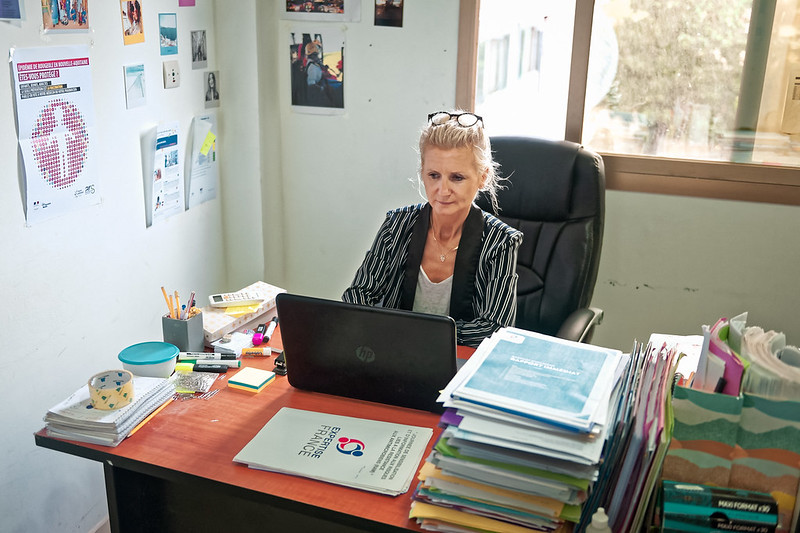TWIN 2H – Twinnings for Hygiene in Hospitals
Objective
-
€ 3mBUDGET
-
01/04/2015PROJECT START
-
42 monthsDURATION
The Ebola virus epidemic, which broke out in the Guinea Forest Region in December 2013, was on an unprecedented scale and mainly affected 3 West African countries: Guinea, Sierra Leone and Liberia.
Following the deaths of over 509 health workers, the role of healthcare facilities – which lack basic products, equipment and staff trained in hospital hygiene – was identified as an accelerator of Ebola epidemics in their initial stages of spreading. Consequently, hospital staff are both victims and vectors of the virus.
In this context, and at the request of the Ministries of Health of the beneficiary countries, and following reflection conducted as part of the “Ebola Recovery Assessment” process, a project was launched to build prevention and control capacities for infections and hospital hygiene via hospital partnerships for the safety of patients and health workers.
A first assessment mission conducted in the spring of 2015 defined the needs and objectives of TWIN2H and, more specifically, of its emergency phase (phase 1, from April to September 2015, Guinea). TWIN2H was followed by a second 24-month phase in Guinea and Liberia (phase 2, from October 2015 to September 2017). The project was subsequently extended by 12 months, until September 2018 (phase 3).
Hospital hygiene: A key factor in health safety
The overall objective of TWIN2H is to contribute to sustainably rebuilding the capacities of health systems to provide quality healthcare, in particular for hygiene and the safety of health workers and patients.
The situation observed in West Africa recalls the need to make strengthening hospital hygiene in healthcare facilities in West Africa a fully-fledged objective of hospital cooperation programmes, with a view to structural action on health systems. Infection prevention and control (IPC) is central to this approach.
More specifically, the objective is to build the capacities of 13 national and regional hospitals and community health centres in terms of hygiene and the management of risks of infection in the 2 target countries – Guinea and Liberia. Indeed, the experience gained during the previous epidemic outbreaks, in particular of Ebola, shows that hospital hygiene is a key factor in patient safety, staff protection and epidemic control.
The project aims to establish sustainable partnerships with hospitals and associations between the North and South, based on improving patient safety in hospitals, while still complying with the national health policies of countries and strengthening healthcare practices via 4 complementary components which provide the basis and values of the APPS (African Partnership for Patient Safety) programme set up by WHO:
• Help improve the governance of health systems in terms of hospital hygiene (phase 2);
• On-site training via mentoring, tutoring and the supervision of Operational Hospital Hygiene Teams (OHHT) (phase 1 and 2)
• Establish material conditions (sorting, water/sanitation and mediation) for the application of protocols (phase 1 and 2)
• Collect, monitor and evaluate hospital hygiene indicators (phase 2)

Objective 1: The governance of health systems is strengthened
In terms of hospital hygiene, the various mentoring missions conducted, the training given in hospitals, as well as the hygiene committees regularly organised, aim to sustainably strengthen the capacities of professionals and actors from the Ministries of Health to respond to a large-scale epidemic.
Consequently, the knowledge, competencies and attitudes in terms of hygiene and infection prevention and control practices have been confirmed.
En #Guinée la semaine dernière, session de travail à l'atelier de #concernement mené par Mamadou Dieng du département #santé d'@expertisefrance pour que les personnels hospitaliers aient le déclic #hygiène au quotidien - l'une des priorités du projet #TWIN2H pic.twitter.com/06WusVPgSv
— Expertise France (@expertisefrance) 1 octobre 2018
Objective 2: Operational hospital hygiene teams are guaranteed in facilities
The Health and Safety Committees (HSCs) of hospital facilities, with a focal point acting as a relay for infection prevention and control (IPC) in each service, guarantee the application of IPC standards and procedures and the monitoring of indicators integrated into the annual action plans of the HSCs.
Objective 3: A staff supervision system is set up
The prefectural health departments (PHDs) and regional health departments (RHDs) are jointly responsible for submitting a supervision report on a regular basis.
The supervision reports make it possible to improve working conditions and hygiene measures in healthcare facilities by ensuring the installation of functional water points in each facility, a maximum level of cleanliness in the facilities and a rehabilitation of deficient hospitals. In addition, it will be possible to transfer the hospital hygiene indicators to the RHD on the basis of the reports issued.
An important IPC indicator has been established: ICSHA, or consumption indicator of hydro-alcoholic solutions.
Projet #TWIN2H : @expertisefrance et ses partenaires réunis à #Conakry pour la clôture de ce projet qui a visé à renforcer l'#hygiène hospitalière pour améliorer la #sécurité des patients et des soignants ► https://t.co/eguBuM70EF#santé #Guinée #sécuritédessoins pic.twitter.com/RgkSZqZkre
— Expertise France (@expertisefrance) 10 octobre 2018


